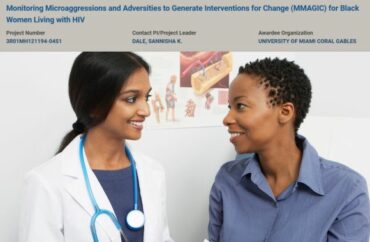
Professor looks at how microaggressions might affect black women with HIV
The National Institutes of Health has spent more than $3 million funding a project to study microaggressions against “black women living with HIV.”
“Monitoring Microaggressions and Adversities to Generate Interventions for Change (MMAGIC) for Black Women Living with HIV,” aims to “shed light on how microaggressions and other adversities (i.e. re-occuring trauma and violence) impact HIV viral suppression among [Black women living with HIV] as mediated by mental health symptoms/diagnosis.”
The NIH allocated $72,588 to the project in 2024, but it has received a total of $3,405,724 since 2019, according to a Fix analysis of public data.
Project leader Sannisha Dale, an associate professor at the University of Miami, and program official Gregory Greenwood, have not responded to two emailed requests for comment in the past month.
The Fix requested a detailed breakdown of the budget, asked about how the study accounts for potential biases in the self-reporting of microaggressions, and asked for the broader relevance of the story.
Dale also chairs the diversity committee for the psychology department at her university.
A Heritage Foundation analyst criticized the project in an email to The Fix.
David Ditch, a senior policy analyst, said “not one penny of NIH funding should go towards studies that are so brazenly based on ideology rather than genuine scientific inquiry.”
He said that the $3 million budget “is high for a project that involves sociological rather than medical research.” He is a former budget analyst for the U.S. Senate.
Ditch told The College Fix the project is not relevant to broader populations “because this is studying niche leftist ideological concerns (microaggressions and intersectionality) and doing so for a very small population group (less than 0.1% of Americans are black women with HIV).”
The NIH funding has produced at least 18 publications so far, focused on “intersectional stigma” and “intersectional adversities,” among other related topics.
“Black women experience microaggressions at the intersection of both race and gender that may differ from those experienced by someone of a different gender and/or race,” the initial publication stated.
“Despite being subtle in expression, gendered racial microaggressions may be associated more to depression for Black women living with HIV because of the daily and pervasive nature of microaggressions,” the authors wrote.
In a later publication, the authors wrote that these women “bear the brunt of the HIV epidemic, and efforts should be directed to ameliorate the burden by addressing structural inequities (e.g., housing, income, and crime rates), intersectional discrimination and stigma, and mental health, and improve HIV outcomes.”
“Policies are needed to increase the household income of [Black women living with HIV] and minimize income disparities, and human rights legislation is needed to improve their quality of life and reduce structural inequities,” the authors wrote.
In a paper from 2022, titled “Monitoring Intersectional Stigma: A Key Strategy to Ending the HIV Epidemic in the United States,” the authors viewed “HIV prevention and treatment” using a “Black feminist critique.”
Professor Dale and a team of researchers wrote:
Originating from a Black feminist critique of the consequences of treating race and gender as mutually exclusive categories, intersectionality is a theoretical framework that examines how intersecting and mutually interdependent forms of power and oppression (e.g., racism, classism, cisgenderism, ableism) drive health inequities.
COVID-19 “reinforced how crucial an intersectional approach is to monitoring effects of interlocking systems of oppression,” they said. The pandemic revealed the necessity of intersectionality not just to “ending the HIV epidemic” but “ultimately toward dismantling the very systems that perpetuate health inequities.”
Federal science victim of ‘ideological capture,’ analyst says
Ditch, the Heritage Foundation analyst, said public health agencies regularly give out money to “ideological” studies.
“Unfortunately, this grant is just one of countless examples of ideological capture in federal science agencies, who receive tens of billions in funding every year,” Ditch told The Fix. “The public and most of Congress are unaware of how much damage that these agencies do to real science, using tax dollars that the country can’t afford when the debt has risen to $34.5 trillion.”
“The National Science Foundation regularly gives out grants promoting ‘indigenous knowledge’ and ‘other ways of knowing’ due to radical activists claiming the modern scientific method is rooted in ‘colonial’ thinking.’”
“The NIH approved a grant based on there being a gap in ‘gender affirmation’ for minority children, which implies that the NIH thinks more adults should be encouraging minority children to become transgender,” Ditch said.
“The CDC approved a grant for ‘eradicating racism’ in HIV treatment in Oakland, CA. This was not based on evidence of bigotry (Oakland’s population is 2/3rds minority), but instead based on cross-racial differences in outcomes,” Ditch said.
“The federal government is waging ideological crusade from all federal agencies rooted in the idea that unequal outcomes are caused by racism.”
MORE: Academics receive $297 million in NIH funds to study racism and health
IMAGES: National Institutes of Health; DAPA Images





Please join the conversation about our stories on Facebook, Twitter, Instagram, Reddit, MeWe, Rumble, Gab, Minds and Gettr.